Nearly six years out of date.
Not leaked audit reports from the Cook Islands, as exposed by Islands Business last month, representing hundreds of millions in unpublished, unaudited micro-state assets.
This time the focus is on a bigger picture – the biggest audit body covering the world’s largest region.
Missing in action—an accountability and transparency report due three years ago in 2018 from PASAI, the Pacific Association of Supreme Audit Institutions.
Promised every three years, PASAI last published an Accountability and Transparency Report back in 2015, nearly six years ago. An online review by Islands Business found no evidence of whether the 2018 report was completed, or what might have happened to it.
What is available publicly from 2018 is an independent strategy review, reporting wide “interference” by Pacific governments in audit affairs.
However the PASAI Secretariat has denied that’s why the reports are missing – blaming a lack of funding instead.
“The 2018 report was not completed because PASAI did not have sufficient funding to complete all its planned activities,” said Mike Heine, Communications Manager for Office of the Auditor General New Zealand, which acts as the secretariat for PASAI.
“Our Office has had no correspondence about this report”, Heine claimed, despite it being described in earlier PASAI publications as a “flagship” document.
Audit New Zealand also claims that there was no negative feedback from island states, or their audit services to earlier reports.
A consultant hired to conduct the independent strategy review did not respond to questions.
Director of International Engagement Sarah Markley however told Islands Business that “this was initially a funding issue, followed by issues with travel restrictions because of Covid-19.
Markley also said PASAI is “primarily an organisation focused on capacity development of auditors.
“When funding was reduced, there was no longer the ability to do all the planned activities under each of the priority areas, so the focus moved to activities more directly linked to supporting auditor capacity development.”
Previous Accountability and Transparency Report reports highlighted “various weaknesses in public financial management processes and auditor capacity, so the findings from past reports continue to inform planning and design of PASAI activities.”
What remains unexplained is how an independent strategy review found interference reported by island auditors, but none was reported to the PASAI secretariat.
The scale of challenges facing regional auditors was highlighted in a piece published on the OAG weblog, titled “Six questions with Sarah Markley, Director of International Engagement.”
Questioned about the greatest challenge facing the public sector, Markley identified the maintenance of “meaningful” citizen engagement.
“The big question facing our democratic and administrative systems right now is: How do we engage, and then how do we deal with and deliver what people want?” asks Markley.
“What role should the public sector play in identifying and providing ‘truth’ to our citizens?”
A limited one it appears, so far.
The fact the PASAI report was missing only came to light through searches for information on the Cook Islands within the secretariat’s online library resources; a smaller investigation prompting the larger.
Answers may have to wait.
“At this stage the difficult decision has been made that this research work would be best done through in-person interviews in order to ensure a high-quality product”, Markley told Islands Business, “so until travel restrictions are removed this work has no timing assigned to it.”
